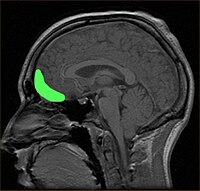
Photo from wikipedia
Neuropsychological studies suggest a distinction between (a) semantic knowledge and (b) control processes that shape the retrieval of conceptual information to suit the task or context. These aspects of semantic… Click to show full abstract
Neuropsychological studies suggest a distinction between (a) semantic knowledge and (b) control processes that shape the retrieval of conceptual information to suit the task or context. These aspects of semantic cognition are specifically impaired in patients with semantic dementia and semantic aphasia, respectively. However, interactions between the structure of knowledge and control processes that are expected during semantic retrieval have not been fully characterised. In particular, domain-general executive resources may not have equal relevance for the capacity to promote weak yet task relevant features (i.e., “controlled retrieval) and to ignore or suppress distracting information (i.e., “selection”). Here, using a feature selection task, we tested the contribution of featural relevance to semantic performance in healthy participants under conditions of divided attention. Healthy participants showed greater dual-task disruption as the relevance value of the distractor feature linearly increased, supporting the emerging view that semantic relevance is one of the organising principles of the structure of semantic representation. Moreover, word frequency, and inter-correlational strength affected overall performance, but they did not show an interaction with dual-task conditions. These results suggest that domain-general control processes, disrupted by divided attention, are more important to the capacity to efficiently avoid distracting information during semantic decision-making than to the promotion of weak target features. The present study therefore provides novel information about the nature of the interaction between structured conceptual knowledge and control processes that support the retrieval of appropriate information and relates these results to a new theoretical framework, termed controlled semantic cognition.
Journal Title: Quarterly Journal of Experimental Psychology
Year Published: 2019
Link to full text (if available)
Share on Social Media: Sign Up to like & get
recommendations!